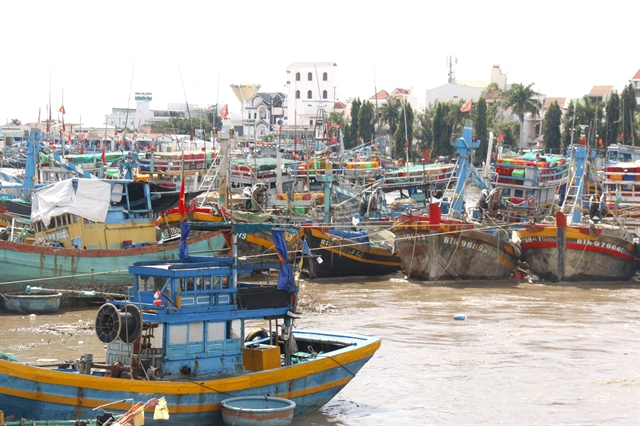 Society
Society

 |
| Residents in Hòa Hiệp Ward, Đắk Lắk Province, sign a joint commitment to prevent local fishing vessels from engaging in IUU fishing activities. — Photo daibieunhandan.vn |
CENTRAL HIGHLAND — The Central Highlands provinces of Đắk Lắk and Lâm Đồng are stepping up efforts to eliminate illegal, unreported and unregulated (IUU) fishing, holding local leaders accountable for lax management and mobilising all forces to ensure full vessel registration and licensing compliance.
In Đắk Lắk, the provincial People’s Committee has issued an urgent directive requiring coastal communes and wards to take decisive measures against IUU fishing.
Following the Prime Minister’s call to strengthen anti-IUU enforcement nationwide, the province has warned that local leaders will face disciplinary action if progress remains stagnant, with no need for prior reprimand or review.
According to the directive, local authorities must mobilise the entire political system to monitor, detect and promptly prevent fishing vessels from violating foreign waters.
Chairpersons of commune-level people’s committees are instructed to conduct a comprehensive review of all vessels operating within their jurisdictions, going “door to door” to guide and support fishermen in completing registration, inspection and licensing procedures in full accordance with national regulations.
Provincial leaders emphasised that the heads of commune and ward people’s committees bear direct responsibility for IUU prevention results.
If serious violations persist, such as vessels entering foreign waters, widespread loss of vessel monitoring system (VMS) connections, or delays in registration and licensing, they will be subject to immediate disciplinary action.
The Đắk Lắk People’s Committee reported that while local IUU prevention efforts have seen some improvement, overall progress remains below expectations.
As of October, 670 out of 2,798 fishing vessels – equivalent to 23.95 per cent – still lack valid fishing permits.
Some areas, such as Hòa Hiệp Ward (down 65 vessels), Hòa Xuân Commune (down 49), and Xuân Đài Ward (down 54), have recorded reductions in unlicensed boats, but the rate remains high.
Conversely, Phú Yên Ward even reported a slight increase, indicating weak supervision.
Provincial Chairman Nguyễn Văn An sternly criticised the underperforming localities for inadequate direction and insufficient results.
The communes and wards concerned were instructed to expedite assistance to fishermen in completing all documentation and to finalise all licensing and inspection targets before October 30.
Nguyễn An Phú, deputy director of the provincial Department of Agriculture and Environment, said Đắk Lắk has not recorded any cases of vessels violating foreign waters or being fined for VMS disconnection at sea since early this year.
Authorities have handled 35 violations with total penalties exceeding VNĐ853 million (around US$33,600).
“The province’s goal is to ensure that every fishing vessel is legally registered, inspected and monitored, leaving no room for illegal activities,” he said.
Đắk Lắk currently operates four certified fishing ports qualified to receive offshore vessels and verify the traceability of seafood catches.
The number of vessels entering and leaving ports via the electronic catch documentation and traceability system (eCDT) has risen, with 10,811 port entries and departures recorded – an increase of 4.4 per cent compared to the previous reporting period.
 |
| Fishing vessels from Lâm Đồng Province anchor along the Cà Ty River in Phan Thiết Ward. — VNA/VNS Photo |
Neighbouring Lâm Đồng Province is also racing against time to resolve outstanding vessel registration and inspection issues.
On October 27, Nguyễn Văn Chiến, deputy director of the provincial Department of Agriculture and Environment, said that the Fisheries and Islands Sub-Department, border guard units and coastal localities have been directed to complete all registration and licensing procedures within the same deadline.
Chiến emphasised that the province is focusing on vessels whose fishing licences or technical inspections have expired, as well as those with frequent VMS signal loss.
“The remaining time is short, and the number of unprocessed vessels remains large. Localities must act swiftly and collaboratively to remove all obstacles,” he said.
Where technical or legal difficulties arise, the Fisheries and Islands Sub-Department has been instructed to promptly report them to provincial and central authorities, ensuring timely resolution.
Colonel Phạm Xuân Độ, deputy commander of the Lâm Đồng Border Guard Command, said marine patrol units have intensified inspections and are determined not to allow unqualified vessels to operate offshore.
“Any vessel that fails to meet registration or inspection requirements will be forced to remain at designated mooring points until all documents are in order,” he said, adding that violators would face strict penalties.
According to the provincial Fisheries and Islands Sub-Department, as of October 23, Lâm Đồng had 8,398 fishing vessels measuring six metres or longer.
Of these vessels, 7,255 still hold valid fishing licences, while 1,143 have expired.
Similarly, 3,212 out of 3,957 vessels have valid technical inspections, leaving 745 overdue.
An additional 311 vessels have been proposed for deregistration due to inactivity or non-compliance.
Lâm Đồng has mobilised all available forces to ensure that all expired vessels are registered and inspected by the end of October.
The province considers this task a vital part of its broader effort to eliminate IUU fishing and align with international fisheries management standards.
Both provinces have reaffirmed that the completion of vessel registration, inspection and licensing procedures is not merely an administrative requirement but a decisive step to remove the European Commission’s “yellow card” warning on Vietnamese seafood exports.
The Central Highlands region, though not a traditional fishing hub, plays a critical role in setting an example of strict compliance and coordination among coastal localities.
As Việt Nam continues to pursue sustainable fisheries management, the determination shown by Đắk Lắk and Lâm Đồng illustrates the country’s wider commitment to fulfilling its international obligations, ensuring transparent seafood traceability, and protecting the long-term livelihoods of its coastal communities. — VNS